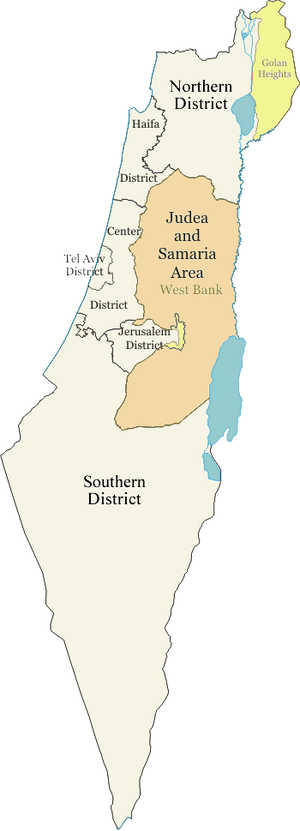Districts of Israel



There are six main administrative districts of Israel, known in Hebrew as mehozot (מחוזות; singular: mahoz) and Arabic as mintaqah and fifteen sub-districts known as nafot (נפות; singular: nafa). Each sub-district is further divided into Cities, municipalities, and Regional councils it contains.
The figures in this article are based on numbers from the Israeli Central Bureau of Statistics and so include all places under Israeli civilian rule including those Israeli-occupied territories where this is the case. Therefore, the Golan sub-district and its four natural regions are included in the number of sub-districts and natural regions even though it is not recognized by the United Nations or the international community as Israeli territory. Similarly, the population figure below for the Jerusalem District was calculated including East Jerusalem whose annexation by Israel is similarly not recognized by the United Nations and the international community. The Judea and Samaria Area, however, is not included in the number of districts and sub-districts as Israel has not applied its civilian jurisdiction in that part of the West Bank.
Jerusalem District
Jerusalem District (Mehoz Yerushalayim). Population: 907,300
District capital: Jerusalem[1]
Northern District
Northern District (Mehoz HaTzafon). Population: 1,241,900
District capital: Nazareth
- Safed (sub-district) – population: 100,500
- Kinneret (sub-district) – population: 100,300
- Yizre'el (sub-district) – population: 444,400
- Akko (sub-district) – population: 555,300
Haifa District
Haifa District (Mehoz Heifa). Population: 880,700
District capital: Haifa
- Haifa (sub-district) – population: 529,300
- Hadera (sub-district) – population: 351,400
Central District
Central District (Mehoz HaMerkaz). Population: 1,770,000
District capital: Ramla
- Sharon (sub-district) – population: 389,600
- Petah Tikva (sub-district) – population: 604,600
- Ramla (sub-district) – population: 282,800
- Rehovot (sub-district) – population: 493,000
Tel Aviv District
Tel Aviv District (Mehoz Tel Aviv). Population: 1,227,900
District capital: Tel Aviv
Southern District
Southern District (Mehoz HaDarom). Population: 1,201,200
District Capital: Beersheba
- Ashkelon (sub district) – population: 456,000
- Be'er Sheva (sub-district) – population: 565,300
Formerly Hof Aza Regional Council with a population of around 10,000 Israeli settlers was part of this district, but the settlements that constituted it were evacuated when the disengagement plan was implemented in the Gaza Strip. Currently only the Coordination and Liaison Administration operates there.
Judea and Samaria Area
Judea and Samaria Area (Ezor Yehuda VeShomron). Jewish population: 327,750 Palestinian population: roughly 2.5 million
Largest Jewish Israeli city: Modi'in Illit
The name Judea and Samaria for this geographical area is based on terminology from the Hebrew and Christian Bibles and other sources relating to ancient Israel and Judah/Judea. The territory has been under Israeli control since the 1967 Six-Day War but not annexed by Israel, pending negotiations regarding its status. Therefore it is not counted as one of the six official districts of Israel. In Jewish religious terms it is part of the "Land of Israel", which leads to politically contentious issues. However, it is not considered part of the State of Israel by any nation or the UN.
See also
References
- ↑ This district includes areas captured in the 1967 Six-Day War and annexed to Israel in the Jerusalem Law.
- ↑ Occupied in the 1967 Six-Day War and internationally unrecognized annexed by Israel's Golan Heights Law.
- ↑ "Regions and territories: The Golan Heights". BBC. 10 August 2010. Retrieved 18 January 2011.
External links
- Population figures for each district and sub-district
- Central Bureau of Statistics – detailed breakdown of each district, sub-district, and natural region.
- Urban Israel: Details and pictures about many cities in Israel
| ||||||||||||||